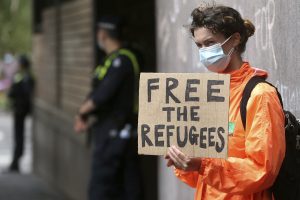The plight of refugees left stranded by Australia’s Stop the Boats policy is again under the microscope after a 23-year-old Sri Lankan self-immolated in a suburban skateboard park, as Pope Francis embarks on a papal tour that will include Papua New Guinea.
Mark Gaetani, the national president of the St. Vincent de Paul Society in Australia, wants the pontiff’s September 6-9 visit to highlight and help resolve the plight of around 48 refugees still held in Papua New Guinea (PNG) under a deal struck by Australia and its neighbors in 2013, and has cost $8.6 billion to date.
He also says Pope Francis would be well aware that those refugees who fled Afghanistan, the Middle East and Sri Lanka, are lacking in sanitary conditions, food, electricity, and health care and are stuck in an alien and difficult country.
There’s a similar story in Australia, where refugees have been put on hold for more than a decade by bridging visas with little to look forward to, which is why friends of Mano Yogalingham say he set himself alight in Noble Park, a southeast suburb of Melbourne, last week.
The Tamil Refugee Council cited one friend as saying that Yogalingham faced “psychological torment inflicted by the Australian Government’s cruel and inhumane policies” and this was compounded by personal challenges to the point where he believed he had nothing left to live for.
A Christian-Tamil who left Sri Lanka as a child, Yogalingham sustained burns to 80 percent of his body and died in hospital a short time later.
Noble Park and neighboring Springvale are ordinary if tough suburbs, well known for their skateboarders and more importantly as a destination for refugees and immigrants who landed from Europe after World War II and then Indo-China, the Middle East, Africa, and Central Asia.
Yogalingham was one of thousands of refugees who had arrived in the neighborhood but the introduction of temporary visas, bridging visas and what is now a widely discredited “fast-track” system to permanent residency has left too many hanging in limbo.
Severe restrictions curtailing work and travel are attached while many have raised children, put them through the Australian education system and still don’t have permanent residency. In other words: “You still don’t belong.”
Yogalingham spent about 12 years on a bridging visa, his application had been rejected and there was a real prospect of being forced to return to a country of which he knew little. He had also campaigned for some 7,350 people on similar deals who deserve to have this mess sorted out.
Still, the lives of asylum seekers in suburbs like Noble Park and Springvale cannot be compared with the hardships and the alienation that stateless refugees face in PNG.
In both countries, stranded asylum seekers are a legacy of governments from both sides of Australian politics, governments that were desperate to stop smugglers from ferrying their human cargo across the Indian Ocean in rickety old boats.
It was, after all, an election issue, with a tough stance appealing to hysterical Australians who believed their country was under threat from those prepared to risk whatever they had for a better life in a better country.
The left-wing Labor government was elected amid some hope it would do better, given its grandstanding on human rights, as opposed to embracing the status quo as a stark warning to others of the hostile or miserable environment that awaits should they enter Australia by boat.
Gaetani and the Catholic Bishops Conference of PNG and the Solomon Islands have written to Home Affairs asking the government to deliver them to Australia urgently. One would also hope the messy visa system would be resolved as they arrive.
Local media did contact Australia’s Home Affairs Minister Tony Burke for comment and his department also fielded questions about the status of Yogalingham’s visa application.
The response was condolences for the family “at this difficult time” but in reality, it was the usual gutless affair, the standard line instituted by previous prime ministers and carried forth by current leader Anthony Albanese.
“For privacy reasons, the department cannot comment on individual cases,” it said.
Perhaps Pope Francis can do better.
*The author grew up in Springvale and rode a skateboard

































